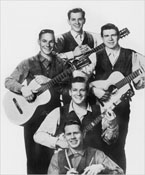
Submit guest columns: [email protected]
“The river’s deep and the river is wide
Hallelujah
Milk and honey on the other side
Hallelujah.”
– “Michael,” The Highwaymen (1961)
A voice from my past is silenced, but the melody lives on.
Dave Fisher. The name may not strike a responsive chord – unless you know someone with that name – but without him, a music group may not have formed in the late 1950s who gave us one of the most memorable songs – and unlikely hits – of the early 1960s.
Fisher, who in 1958 joined with four other freshmen from the same fraternity at Wesleyan University in Middletown, Conn., to form the folk music group, The Highwaymen, died May 7, 2010, at his home in Rye, N.Y. He was 69.
The cause of death was myelofibrosis, a bone marrow disorder, according to his wife, Elaine K. Haagen, a medical doctor. It’s the same disease that claimed the life of my dad. J. Vernon Bishop, 76, in 1998.
The Highwaymen were noteworthy for living out a fairy tale – twice. In 1958, as freshman initiates of a fraternity, they had to come up with an entertainment act. Under the guidance of Fisher – who as a high school student had sung and recorded with the Academics, a doo-wop group – they put together a folk music show.
Folk music, particularly collegiate folk, was surging in popularity, and The Highwaymen, as they called themselves, gathered momentum, with robust voices, acoustic guitars and other instruments. Fisher arranged their songs, played banjo and was first tenor.
Someone encouraged the group to get in touch with talent agents in New York City. They met Ken Greengrass in November 1960. He became their manager and arranged an audition with United Artists Records.
By the fall of 1961 the group had the No. 1 song in the country, “Michael, Row the Boat Ashore,” an African-American spiritual that was released under the shortened title “Michael.” I bought the 45 disc and liked the group’s sound so much that I later purchased their album, which included their follow-up hits, “Gypsy Rover” (#42 in 1961) and “Cotton Fields” (#13 in 1962).
The students went on to graduate, then headed for Greenwich Village to join its percolating folk scene. They broke up in 1964, after 8 albums and 10 singles and three appearances on “The Ed Sullivan Show.”
Fisher stood out partly because of his distinctive tenor voice but also because he was the only member dedicated to remaining a professional musician. Two other members went to Harvard Law School, one to Harvard Business School and one to graduate school at Columbia, then proceeded into law, business and academia. But Fisher stayed in the music business.
Fisher kept a version of the Highwaymen going for a couple of years, acting as music director but not singing and playing himself. He then went to Hollywood, composing and arranging music for films and television and working as a studio singer and musician.
Now comes the part of the musical folk tale that I didn’t know until I read Fisher’s obituary online and looked up more information.
According to a tribute article by Douglas Martin published May 12 in the New York Times, Fisher attended a concert in 1990 in Houston, Tex., to hear another group that called itself the Highwaymen, this one composed of country superstars Willie Nelson, Waylon Jennings, Johnny Cash and Kris Kristofferson. Fisher noticed that the “imposters” were selling T-shirts and other paraphernalia with “Highwaymen” emblazoned on them.
Led by their former bandmate Steve Trott, who had been a high official in the Reagan administration’s Justice Department and gone on to become a judge on the United States Court of Appeals for the Ninth Circuit, the original Highwaymen sued for copyright infringement.
Jennings came up with a solution. He offered the originals the chance to open for the supergroup at a show in Los Angeles. The originals, who had reunited in 1987 for a concert at their 25th college reunion, had begun toying with the idea of playing together occasionally again. So they jumped at the offer.
In their second life the Highwaymen issued five more CDs. Blitz, the rock ’n’ roll magazine, called their album “When the Village Was Green” one of the best releases of 2007. The magazine recently honored “The Cambridge Tapes,” a recording of a Highwaymen concert at the Massachusetts Institute of Technology in 1963, as the best reissue or compilation of 2009.
Bob Burnett, an original Highwayman and for many years a trusts lawyer, said Fisher had remained the group’s inspiration. “Dave picked most of the songs that we sang and arranged them,” he said in an interview. “He was our musical leader.”
Of the original five Highwaymen, Burnett, Trott and Butts are living. Chan Daniels died in 1975.
Even though my weekly radio program on WEMC-FM, “Friday Night Jukebox,” plays exclusively the music of the 1950s, I bent the rules a bit on the show for May 21 and played “Michael” and another hit, “Cotton Fields,” as a tribute to the late Dave Fisher and his renowned group, The Highwaymen.
I’ll keep whistling this haunting tune as long as I can keep both oars in the water. Thanks, Dave.










